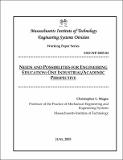Needs and Possibilities for Engineering Education: One Industrial/Academic Perspective
Author(s)
Magee, Christopher L.
Downloadesd-wp-2003-04.pdf (349.1Kb)
Metadata
Show full item recordAbstract
This paper reports a personal assessment of the readiness of new B.S. level engineering graduates to practice engineering immediately upon graduation. This assessment when reinforced by significant prior work motivates a systemic analysis of the U.S. Engineering Education System. The analysis is framed to address the implementation potential of ideas for how educators might efficiently teach undergraduate engineers “that engineering is more than differential equations”. The concepts which seem best from this analysis are combinations of aggressive intern opportunities combined with courses (starting in the freshman year) that emphasize the creative engineering process. These activities may be containable in the 4 year program but the analysis also suggests that extension of engineering education to 3 or more years beyond the B.S. would improve the possibility of reaching key educational goals including teaching adequate math and science fundamentals as well as engineering knowledge, process and creativity. Such radical change will be difficult and slow to occur (if at all) in this complex system. Moreover, this system is understandingly resistant to change because of significant perceptions of outstanding achievement. The driving force for change that may be strong enough to overcome these barriers is prospective students’ falling perceptions of engineering education as a preferred option.
Date issued
2003-06Publisher
Massachusetts Institute of Technology. Engineering Systems Division
Series/Report no.
ESD Working Papers;ESD-WP-2003-04